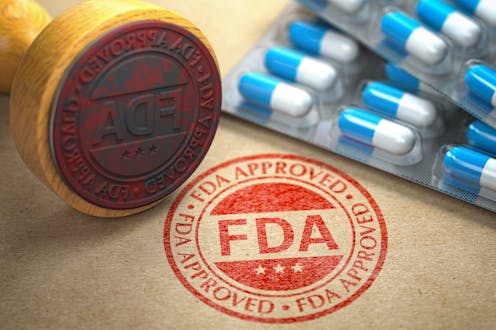Don’t let ‘FDA-approved’ or ‘patented’ in ads give you a false sense of security
- Written by Michael Mattioli, Professor of Law and Louis F. Niezer Faculty Fellow, Indiana University

If you’ve ever reached for a bottle of moisturizer labeled “patented” or “FDA approved,” you might want to think twice. In a recent study[1] of hundreds of advertisements, I found that supplements and beauty products often misleadingly use these terms to suggest safety or efficacy.
As a law professor[2], I suspect this is confusing for consumers, maybe even dangerous. Having a patent means only that you can stop others from making, using, selling or importing your invention. It doesn’t mean the invention works or that it won’t blow up in your face.
“FDA approved,” meanwhile, means a product’s benefits have been found to outweigh its risks[3] for a specific purpose – not that it’s of high quality or low risk in general.
Led astray by the label
I wanted to know whether companies exploit these sorts of misunderstandings, so I analyzed hundreds of ads from print, television and social media that mention patents or FDA approval. I found that advertisers throw these terms around in confusing ways.
For example, I found an ad for a probiotic supplement stating, “The proof is in the patent”; an ad for an earwax removal product stating its “patented formula is safe, effective, and clinically proven”; and an ad for a headache remedy that made the words “FDA approved” a bold visual focal point.
Here’s the concerning part: I looked at all kinds of products and found that these terms appear most often in ads for things you eat or rub onto your skin, such as supplements, insecticides, toothpaste and lotions.
That’s probably no coincidence. Products like this aren’t tightly regulated, yet consumers want to know they’re safe. It seems likely that advertisers are name-dropping the government to make people think just that.
Risks to consumers − and to innovation
One danger is clear: Ads with vague references to government authorities could dupe consumers into thinking products are safer or more effective than they actually are. In fact, there’s some evidence this is already happening[4].
Another risk is that this creates perverse incentives for business. Companies could chose to forgo actual innovation, focusing instead on securing dubious patents or regulatory nods to keep up in the advertising race[5].
These practices could distort competition, burden government agencies with frivolous patent applications and deter new entrants from competing in markets where they can’t employ similar advertising tactics.
Questions remain
Even though my study has shed light on how often these tricky advertising methods are used, it leaves some big questions unanswered. What exactly makes consumers respond so favorably[6] to terms like “patented” or “FDA approved”? And who is most likely to be confused by these tactics?
As a next step, I plan to conduct comprehensive surveys of consumers, along with in-depth interviews, to explore how these labels resonate emotionally. I hope to coordinate with researchers from psychology and media studies. Research along these lines could offer policymakers the robust evidence they need to make changes to the law.
What might those changes look like? For one thing, the law could make it easier for groups of consumers to sue in federal courts over misleading ads. The Federal Trade Commission could also place more of a burden on companies to prove their ads are honest. These changes could make a big difference in ensuring companies persuade shoppers without confusing them.
At a time when ads are everywhere and Americans are losing trust in institutions – and each other – the stakes for truthful product claims are high.
References
- ^ recent study (dx.doi.org)
- ^ law professor (law.indiana.edu)
- ^ a product’s benefits have been found to outweigh its risks (www.fda.gov)
- ^ this is already happening (doi.org)
- ^ keep up in the advertising race (www.voguebusiness.com)
- ^ respond so favorably (doi.org)







